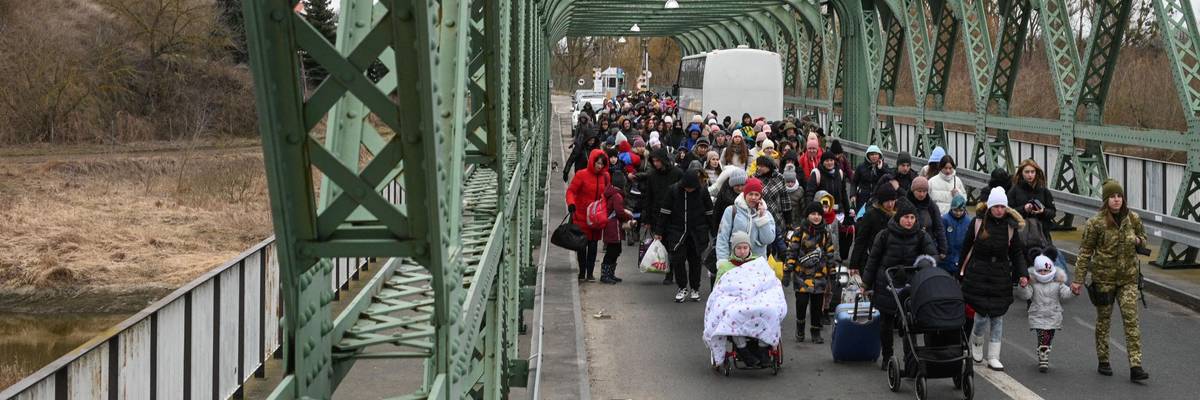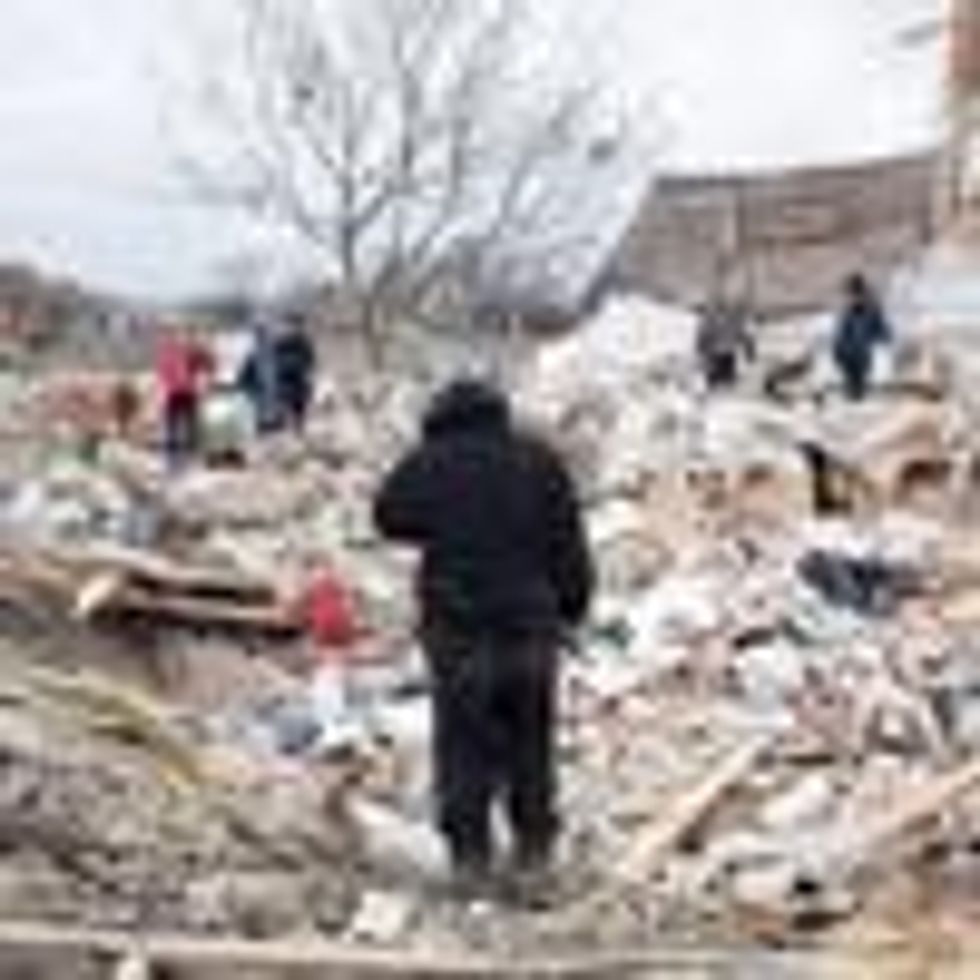

SUBSCRIBE TO OUR FREE NEWSLETTER
Daily news & progressive opinion—funded by the people, not the corporations—delivered straight to your inbox.
5
#000000
#FFFFFF
To donate by check, phone, or other method, see our More Ways to Give page.


Daily news & progressive opinion—funded by the people, not the corporations—delivered straight to your inbox.

Ukrainian refugees walk a bridge at the buffer zone with the border with Poland in the border crossing of Zosin-Ustyluh, western Ukraine on March 6, 2022. (Photo: Daniel Leal/AFP via Getty Images)
Despite evacuation efforts hampered by Russian shelling, Ukraine is enduring Europe's most rapidly escalating refugee crisis since the second world war, the United Nations high commissioner for refugees said Sunday.
"More than 1.5 million refugees from Ukraine have crossed into neighboring countries in 10 days--the fastest-growing refugee crisis in Europe since World War II," tweeted the commissioner, Filippo Grandi.
Also highlighting the crisis created by Russian President Vladimir Putin's invasion of Ukraine, the U.N. Refugee Agency warned Sunday that "in the coming days millions more lives will be uprooted, unless there is an immediate end to this senseless conflict."
Putin, whose deadly assault has been marked by mounting war crime allegations, has shown no signs that he is willing to withdraw Russian forces or cease air attacks that have made it harder for civilians to seek safety. In the Ukrainian city Mariupol, for example, shelling on Sunday led an evacuation effort to be canceled for the second day in a row.
Related Content

During a televised meeting with Russian flight attendants on Saturday, Putin blamed the war on Ukraine's leaders and slammed Ukrainian resistance to the invasion.
"If they continue to do what they are doing, they are calling into question the future of Ukrainian statehood," he said. "And if this happens, it will be entirely on their conscience."
The Russian president also attacked economic sanctions that Western governments have imposed in response to the Russian invasion.
"These sanctions that are being imposed, they are akin to declaring war," Putin said. "But thank God, we haven't got there yet."
Putin's rhetoric since launching the assault of Ukraine on February 24 has heightened concerns about potential nuclear war.
While Ukrainian President Volodymyr Zelenskyy continues to pressure Western governments and the North Atlantic Treaty Organization (NATO) to impose a no-fly zone over Ukraine, anti-war activists and experts fear such action would trigger a further escalation that could have catastrophic consequences on a global scale.
Global anti-war protests were held throughout the weekend demanding an immediate end to Russia's war on its neighbor as well as an end to NATO expansion that has long fueled tension in the region.
Dear Common Dreams reader, The U.S. is on a fast track to authoritarianism like nothing I've ever seen. Meanwhile, corporate news outlets are utterly capitulating to Trump, twisting their coverage to avoid drawing his ire while lining up to stuff cash in his pockets. That's why I believe that Common Dreams is doing the best and most consequential reporting that we've ever done. Our small but mighty team is a progressive reporting powerhouse, covering the news every day that the corporate media never will. Our mission has always been simple: To inform. To inspire. And to ignite change for the common good. Now here's the key piece that I want all our readers to understand: None of this would be possible without your financial support. That's not just some fundraising cliche. It's the absolute and literal truth. We don't accept corporate advertising and never will. We don't have a paywall because we don't think people should be blocked from critical news based on their ability to pay. Everything we do is funded by the donations of readers like you. Will you donate now to help power the nonprofit, independent reporting of Common Dreams? Thank you for being a vital member of our community. Together, we can keep independent journalism alive when it’s needed most. - Craig Brown, Co-founder |
Despite evacuation efforts hampered by Russian shelling, Ukraine is enduring Europe's most rapidly escalating refugee crisis since the second world war, the United Nations high commissioner for refugees said Sunday.
"More than 1.5 million refugees from Ukraine have crossed into neighboring countries in 10 days--the fastest-growing refugee crisis in Europe since World War II," tweeted the commissioner, Filippo Grandi.
Also highlighting the crisis created by Russian President Vladimir Putin's invasion of Ukraine, the U.N. Refugee Agency warned Sunday that "in the coming days millions more lives will be uprooted, unless there is an immediate end to this senseless conflict."
Putin, whose deadly assault has been marked by mounting war crime allegations, has shown no signs that he is willing to withdraw Russian forces or cease air attacks that have made it harder for civilians to seek safety. In the Ukrainian city Mariupol, for example, shelling on Sunday led an evacuation effort to be canceled for the second day in a row.
Related Content

During a televised meeting with Russian flight attendants on Saturday, Putin blamed the war on Ukraine's leaders and slammed Ukrainian resistance to the invasion.
"If they continue to do what they are doing, they are calling into question the future of Ukrainian statehood," he said. "And if this happens, it will be entirely on their conscience."
The Russian president also attacked economic sanctions that Western governments have imposed in response to the Russian invasion.
"These sanctions that are being imposed, they are akin to declaring war," Putin said. "But thank God, we haven't got there yet."
Putin's rhetoric since launching the assault of Ukraine on February 24 has heightened concerns about potential nuclear war.
While Ukrainian President Volodymyr Zelenskyy continues to pressure Western governments and the North Atlantic Treaty Organization (NATO) to impose a no-fly zone over Ukraine, anti-war activists and experts fear such action would trigger a further escalation that could have catastrophic consequences on a global scale.
Global anti-war protests were held throughout the weekend demanding an immediate end to Russia's war on its neighbor as well as an end to NATO expansion that has long fueled tension in the region.
Despite evacuation efforts hampered by Russian shelling, Ukraine is enduring Europe's most rapidly escalating refugee crisis since the second world war, the United Nations high commissioner for refugees said Sunday.
"More than 1.5 million refugees from Ukraine have crossed into neighboring countries in 10 days--the fastest-growing refugee crisis in Europe since World War II," tweeted the commissioner, Filippo Grandi.
Also highlighting the crisis created by Russian President Vladimir Putin's invasion of Ukraine, the U.N. Refugee Agency warned Sunday that "in the coming days millions more lives will be uprooted, unless there is an immediate end to this senseless conflict."
Putin, whose deadly assault has been marked by mounting war crime allegations, has shown no signs that he is willing to withdraw Russian forces or cease air attacks that have made it harder for civilians to seek safety. In the Ukrainian city Mariupol, for example, shelling on Sunday led an evacuation effort to be canceled for the second day in a row.
Related Content

During a televised meeting with Russian flight attendants on Saturday, Putin blamed the war on Ukraine's leaders and slammed Ukrainian resistance to the invasion.
"If they continue to do what they are doing, they are calling into question the future of Ukrainian statehood," he said. "And if this happens, it will be entirely on their conscience."
The Russian president also attacked economic sanctions that Western governments have imposed in response to the Russian invasion.
"These sanctions that are being imposed, they are akin to declaring war," Putin said. "But thank God, we haven't got there yet."
Putin's rhetoric since launching the assault of Ukraine on February 24 has heightened concerns about potential nuclear war.
While Ukrainian President Volodymyr Zelenskyy continues to pressure Western governments and the North Atlantic Treaty Organization (NATO) to impose a no-fly zone over Ukraine, anti-war activists and experts fear such action would trigger a further escalation that could have catastrophic consequences on a global scale.
Global anti-war protests were held throughout the weekend demanding an immediate end to Russia's war on its neighbor as well as an end to NATO expansion that has long fueled tension in the region.